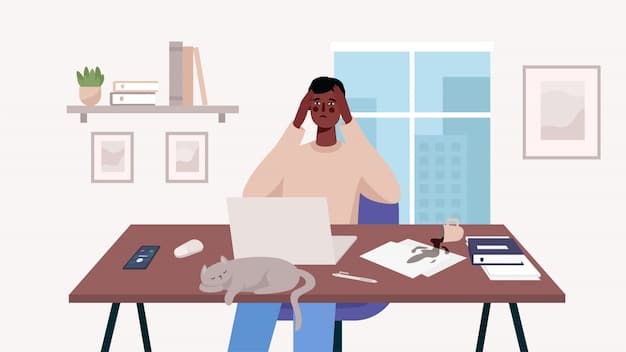Beat Gig Economy Burnout: Work-Life Balance Strategies

Gig Economy Burnout: Proven Strategies to Maintain Work-Life Balance and Avoid Exhaustion involves implementing effective time management, setting boundaries, prioritizing self-care, and leveraging technology to foster a sustainable and balanced work life. These strategies help mitigate stress and enhance overall well-being.
The gig economy offers flexibility and autonomy, but it can also lead to Gig Economy Burnout: Proven Strategies to Maintain Work-Life Balance and Avoid Exhaustion. The constant hustle, irregular schedules, and pressure to find the next project can take a significant toll on your mental and physical well-being. Let’s explore some proven techniques to combat burnout and achieve a healthier work-life balance.
Understanding Gig Economy Burnout
Before diving into solutions, it’s crucial to understand what contributes to burnout in the gig economy. This understanding will help you identify triggers and proactively manage them.
Burnout in the gig economy isn’t just about being tired; it’s a state of emotional, physical, and mental exhaustion caused by prolonged or excessive stress. It differs slightly from traditional employment burnout due to the unique nature of gig work.
Factors Contributing to Burnout
Several factors peculiar to gig work can compound stress levels:
- Inconsistent Income: The uncertainty of income streams can lead to financial anxiety and pressure to constantly seek new opportunities.
- Lack of Benefits: Gig workers often lack traditional employee benefits like health insurance, paid time off, and retirement plans, increasing financial insecurity.
- Isolation: Working alone can lead to feelings of loneliness and disconnect, impacting mental health.
- Blurred Boundaries: The flexibility of gig work can make it difficult to separate work from personal life, leading to overwork and exhaustion.
Recognizing the Signs of Burnout
Identifying burnout early is key to preventing it from escalating. Look out for these warning signs:
- Chronic Fatigue: Persistent tiredness that doesn’t improve with rest.
- Cynicism and Detachment: Feeling negative or indifferent toward your work.
- Reduced Performance: Difficulty concentrating and completing tasks effectively.
- Physical Symptoms: Headaches, digestive issues, and sleep disturbances.
Understanding the nature of gig economy burnout is the first step towards implementing effective strategies to achieve sustainable balance and well-being in your work life.

Setting Realistic Goals and Boundaries
One of the most effective ways to combat burnout is to set realistic goals and boundaries in your gig work. This proactive approach can help prevent overcommitment and protect your time and energy.
Setting realistic goals starts with understanding your capacity and limitations. Many gig workers fall into the trap of overpromising to secure contracts, which can lead to stress and diminished quality of work.
Defining Your Work Capacity
Assess how many hours you can realistically work each week without depleting your energy. Consider your personal obligations, family responsibilities, and the need for downtime.
Learning to Say No
Saying no to projects or tasks that don’t align with your goals or exceed your capacity is vital. Prioritize quality over quantity, and don’t hesitate to decline opportunities that could stretch you too thin.
Establishing Clear Boundaries
Setting clear boundaries between work and personal life is equally important. Designate specific work hours and stick to them as much as possible. Communicate these boundaries to clients and family members to minimize interruptions.
- Designate a Workspace: Create a dedicated workspace to help mentally separate work from personal life.
- Set Communication Guidelines: Establish rules for responding to emails and calls during off-hours.
- Take Regular Breaks: Schedule short breaks throughout the day to rest and recharge.
Setting achievable goals and steadfast boundaries will dramatically reduce the risk of burnout, increase productivity, and enhance work satisfaction and overall well-being.
Time Management and Prioritization
Effective time management and prioritization are crucial skills for gig workers looking to avoid burnout. These skills allow you to make the most of your time, reduce stress, and maintain a healthy workload.
Mastering these techniques can lead to increased efficiency, decreased stress levels, and a better work-life integration.
Utilizing Time Management Techniques
Experiment with different time management techniques to find what works best for you:
- Pomodoro Technique: Work in focused intervals (e.g., 25 minutes) followed by short breaks.
- Time Blocking: Allocate specific blocks of time for different tasks or projects.
- Eat the Frog: Tackle the most challenging task first thing in the morning to get it out of the way.
Prioritizing Tasks Effectively
Learn to prioritize tasks based on their importance and urgency. The Eisenhower Matrix is a helpful tool for this:
- Urgent and Important: Do these tasks immediately.
- Important but Not Urgent: Schedule these tasks for later.
- Urgent but Not Important: Delegate these tasks if possible.
- Neither Urgent Nor Important: Eliminate these tasks.
Minimizing Distractions
Identify common distractions and strategies to minimize them:
- Use Website Blockers: Block distracting websites and social media during work hours.
- Turn Off Notifications: Disable notifications on your phone and computer to avoid constant interruptions.
- Create a Focused Environment: Find a quiet workspace where you can concentrate without distractions.
With adept time management and prioritization, gig workers can reduce the feeling of being overwhelmed. This promotes a sustainable and enjoyable work life, while reducing the risk of burnout.
The Importance of Self-Care
Self-care is not a luxury; it’s a necessity, particularly for gig workers at risk of burnout. Engaging in regular self-care activities helps recharge your mind and body, maintain overall wellness, and foster resilience.
Integrating self-care practices can lead to improved job satisfaction, lower stress levels, and increased emotional stability.
Physical Self-Care
Prioritize activities that nurture your physical health:
- Regular Exercise: Engage in physical activity you enjoy, whether it’s walking, running, swimming, or dancing.
- Healthy Diet: Eat nutritious meals and snacks to fuel your body and mind.
- Adequate Sleep: Aim for 7-9 hours of quality sleep each night to support physical and cognitive function.
Mental and Emotional Self-Care
Take time to nurture your mental and emotional well-being:
Practicing mindfulness meditation, or expressing your creativity through writing, painting, or music can all improve inner peace:.
Social Self-Care
Maintain connections with friends and family:
Schedule regular social outings to have fun and remind yourslef that you are not alone in life:.
- Schedule Social Activities: Make time for social events and gatherings with friends.
- Connect with Loved Ones: Stay in touch with family members and loved ones.

By consistently committing to self-care, gig workers can build a foundation of well-being that protects against burnout. Self-care promotes increased life satisfaction, improved health, and a greater ability to handle the demands of work.
Leveraging Technology for Balance
Technology can be both a contributor to and a solution for burnout in the gig economy. By leveraging the right digital tools, you can streamline your work, automate tasks, and create a more balanced lifestyle.
Here are ways to use technology to reduce stress and improve your quality of life.
Automation Tools
Explore tools that can automate repetitive tasks:
- Project Management Software: Use tools like Trello or Asana to organize projects and tasks.
- Email Automation: Schedule emails and automate responses to save time.
Communication and Collaboration Tools
Improve communication and collaboration with clients and colleagues:
Effectively using communication media can drastically change working patterns and remove some of the stress from projects.
Wellness Apps and Tools
Utilize apps and tools that promote wellness and mindfulness:
- Meditation Apps: Calm and Headspace offer guided meditations to reduce stress.
- Fitness Trackers: Track your physical activity and sleep patterns to stay healthy.
Smart use of technology can increase productivity exponentially and reduce feelings of stress. By implementing these strategies, gig workers can build sustainable workflows and reduce the risk of burnout.
Building a Supportive Network
Having a strong supportive network can be a game-changer for gig workers. Isolation can exacerbate feelings of stress and burnout, but connecting with others can provide emotional support, reduce loneliness, and offer opportunities for collaboration and growth.
Let’s discuss some key strategies for forming and maintaining connections.
Joining Online Communities
Participate in online communities relevant to your industry or interests:
Online Communities can be a great way to communicate about projects and ask for any advice or help needed.
Attending Industry Events
Attend conferences, workshops, and meetups to network with professionals in your field:
- Meet New People: Expand your professional network and meet potential collaborators.
- Stay Updated: Learn about the latest trends and best practices in your industry.
Seeking Mentorship or Coaching
Find a mentor or coach who can provide guidance and support:
- Receive Advice: Benefit from the experience and insights of someone more experienced.
- Gain Perspective: Get guidance on how to navigate challenges and achieve your goals.
Finding mentors or coaches in your area of work or expertise can reduce stress or anxiety people feel about working on their own. This will also bring about new networks for you to grow from as you grow your own business.
| Key Point | Brief Description |
|---|---|
| ⏱️ Time Management | Techniques like Pomodoro help focus and reduce overwhelm. |
| 🧘 Self-Care | Prioritize exercise, diet, and sleep for overall well-being. |
| 🤝 Network | Connect with communities for support & collaboration. |
| 📱 Technology | Use apps/tools to automate tasks and track wellness. |
FAQ
▼
Key signs include chronic fatigue, cynicism towards work, reduced performance, sleep disturbances, and physical symptoms like headaches. A combination of these may suggest impending burnout.
▼
Set specific work hours, establish a dedicated workspace, and communicate boundaries to clients. Decide on your work availability and share this with clients for stress reduction.
▼
Use techniques like Pomodoro, time blocking, and the Eisenhower Matrix. Remove distractions with website blockers and app controls for optimal time management.
▼
Self-care helps recharge your mind and body, maintains wellness, and builds resilience. Implement a strategy of regular relaxing and enjoyable activities for mental ease.
▼
Tech improves balance by streamlining tasks, automation, and wellness apps. Use communication software instead of traditional emails for faster workflow and less stress towards project deadlines.
Conclusion
Combating gig economy burnout requires a holistic approach that combines effective strategies with a proactive mindset. By understanding the causes of burnout, setting boundaries, managing time, prioritizing self-care, and building a supportive network, gig workers can achieve a healthier work-life balance and thrive in their careers. Commit to these strategies, and you’ll be well-equipped to handle the challenges of the gig economy while maintaining your well-being.





